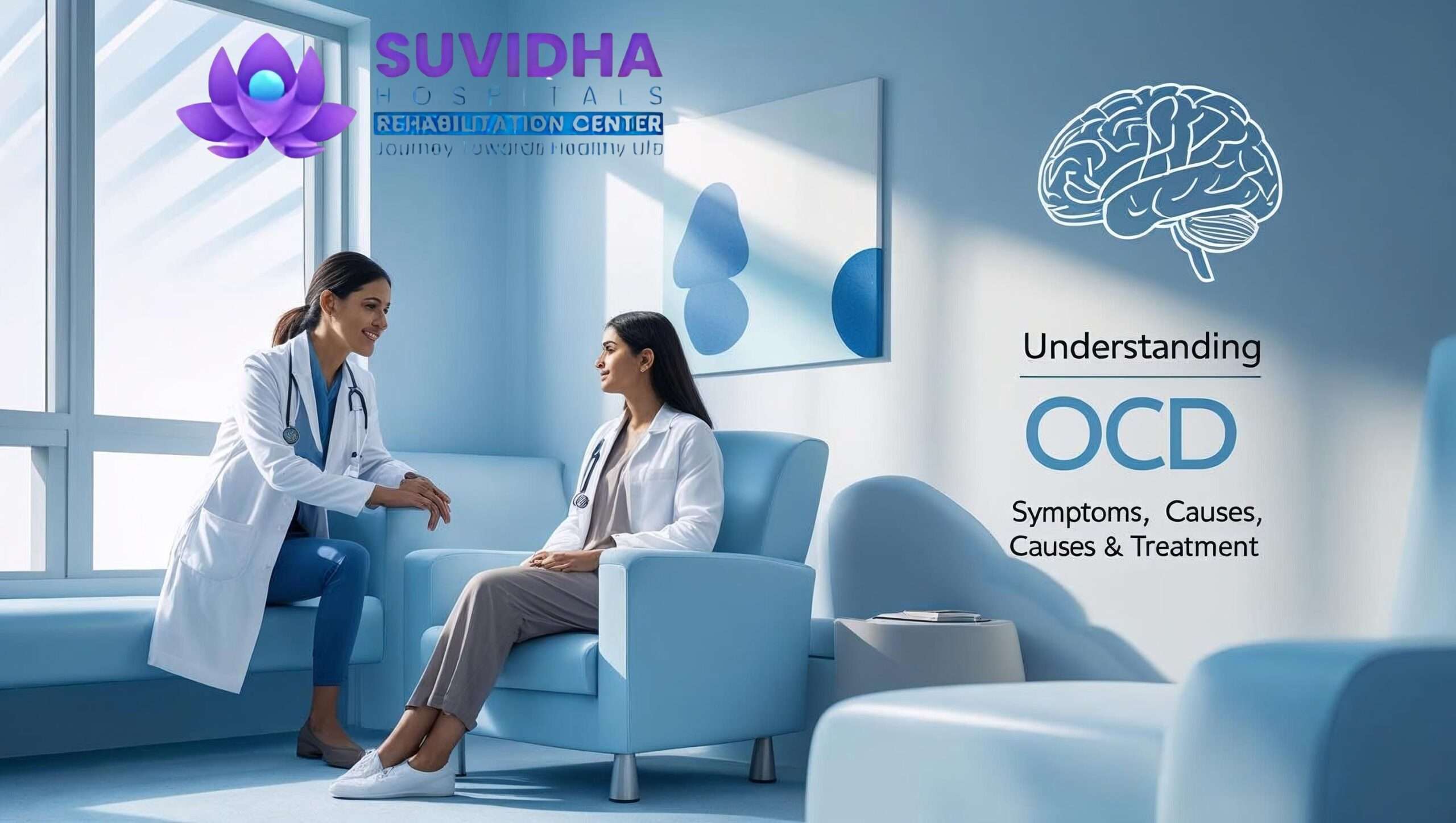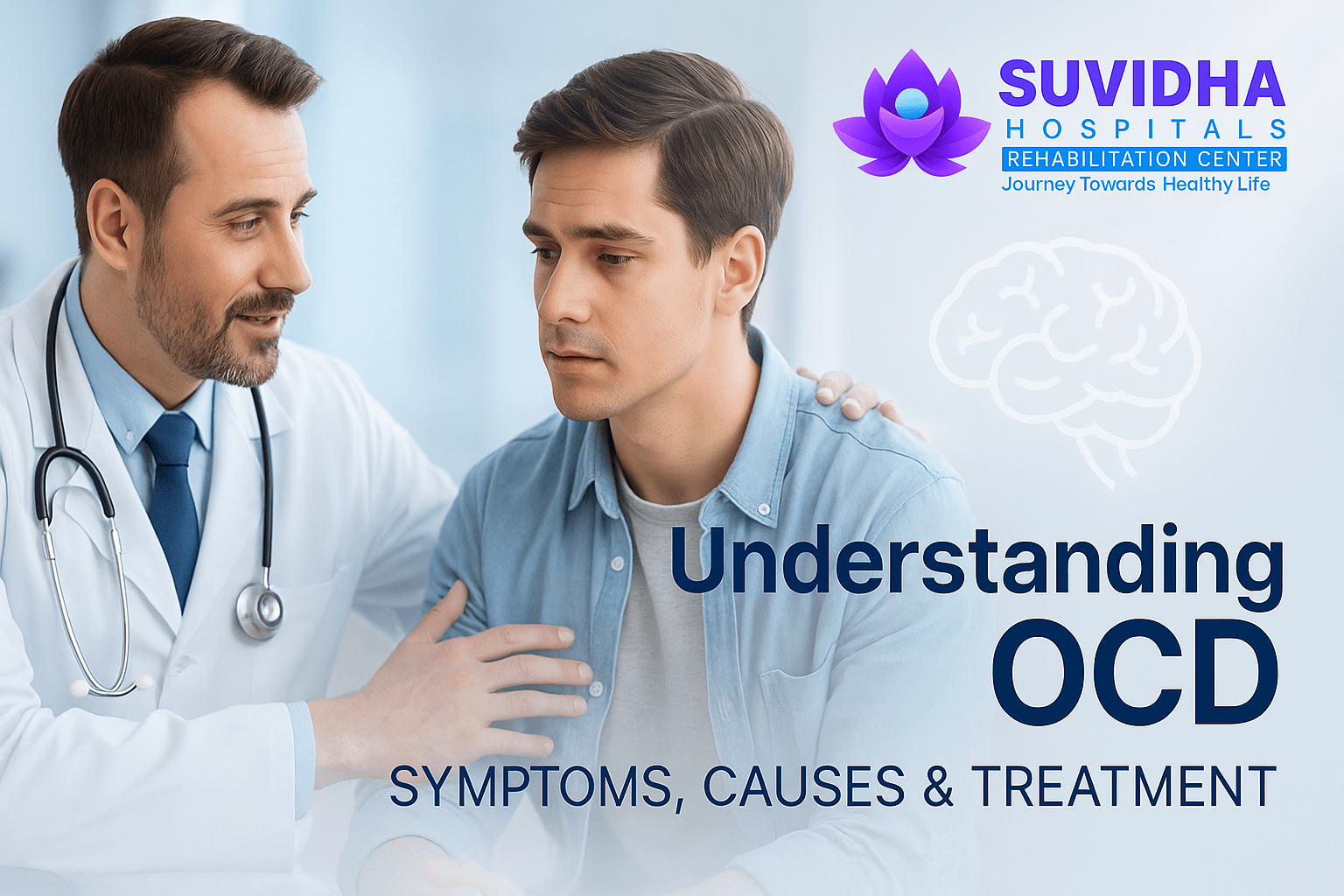OCD Symptoms, Causes, and Treatment
In today’s fast-paced world, we often toss around terms like “I’m so OCD” casually to describe someone who likes things neat or organized. But Obsessive-Compulsive Disorder (OCD) is far more complex and deeply impactful than just a preference for order. At Suvidha Hospital, recognized as the best OCD rehabilitation center in Hyderabad, we understand the unique struggles individuals with OCD face—and we’re committed to helping them reclaim control of their lives.

What is Obsessive-Compulsive Disorder (OCD)?
Obsessions—unwanted, intrusive thoughts or urges—and compulsions—repetitive actions or rituals carried out to reduce the discomfort brought on by those obsessions—are the hallmarks of obsessive compulsive disorder (OCD), a chronic mental health illness. For instance, someone who has a cleaning obsession may wash their hands numerous times a day, even though they are aware that this is excessive. Relationships, everyday routines, and even one’s physical health may be affected by these patterns.
Types of OCD
OCD manifests differently from person to person. Here are some of the most common types:
Contamination OCD: Excessive cleaning or avoidance behaviors brought on by a fear of germs or illness.
Checking OCD: Constantly checking personal safety, appliances, or locks.
Ordering and Symmetry: An obsession with order, symmetry, or ‘just right’. Unwanted thoughts of hurting oneself or others that result in avoidance or reassurance-seeking activities are known as harm OCD.
Intrusive ideas that go against one’s moral convictions or principles are known as sexual or religious obsessions.
These subtypes often overlap and evolve, which is why personalized care is essential.
Causes of OCD
The exact cause of OCD isn’t known, but several factors are believed to contribute:
- Genetics: Family history increases the likelihood of developing OCD.
- Brain Structure and Functioning: Differences in certain brain areas, particularly involving serotonin, may play a role.
- Environmental Factors: Trauma, abuse, or stressful life events can trigger or worsen OCD symptoms.
- Personality Traits: People with perfectionist or highly responsible personalities may be more vulnerable.
Understanding these underlying causes helps shape effective treatment plans at centers like Suvidha Hospital, one of the best rehabilitation centers in Hyderabad.
Treatment Approaches in an OCD Rehabilitation Center
A mix of supportive, medical, and psychological therapy are needed to treat OCD. The OCD Rehabilitation Center at Suvidha Hospital provides a methodical and caring approach that addresses the underlying causes of the condition rather than just its symptoms.
Cognitive Behavioral Therapy (CBT)
CBT is regarded as the most effective treatment for OCD. It assists patients in identifying and reframing skewed ideas and opinions. Exposure and Response Prevention (ERP), the most successful type of cognitive behavioral therapy for OCD, involves exposing patients to their phobias gradually while teaching them to control their compulsive reactions.
Medication Management
OCD can be well managed with certain drugs, particularly Selective Serotonin Reuptake Inhibitors (SSRIs). In order to minimize adverse effects and maximize benefits, our skilled psychiatrists regularly monitor and modify medications.
Behavioral Therapy
Behavioral therapies, in addition to ERP, assist patients in creating constructive coping mechanisms. Methods such as mindfulness, relaxation training, and habit reversal can be very helpful in lowering anxiety and compulsions.
Group Therapy & Support Systems
Being aware that you’re not alone is one of the most effective strategies for rehabilitation. Our group therapy sessions promote accountability, peer support, and sharing of experiences. In order to educate loved ones and fortify support systems, family therapy is also provided.
OCD Treatment at Suvidha Hospital Rehabilitation Center
At Suvidha Hospital, our OCD treatment program is designed to offer:
- Personalized care plans developed by experienced psychiatrists and psychologists.
- 24/7 medical supervision to ensure safety and stability.
- Holistic therapies including yoga, meditation, and art therapy to support emotional wellness.
- Daily structure and routine, which is vital in managing OCD symptoms.
- Long-term support and follow-up care to prevent relapse and encourage independence.
Our multidisciplinary team ensures that patients don’t just recover—they thrive.
FAQs
While there is no “cure” in the traditional sense, OCD is highly treatable. With consistent therapy and support, many individuals lead full, productive lives. At Suvidha Hospital, we’ve helped hundreds manage and even overcome their symptoms.
OCD can be chronic, but the intensity of symptoms can significantly reduce over time with treatment. Early intervention increases the chances of long-term management and recovery.
Untreated OCD can worsen and lead to other mental health conditions like depression, anxiety, or substance abuse. It can severely affect work, relationships, and overall quality of life.
Indeed. Childhood or adolescence is generally when OCD first manifests. Children may exhibit repetitive habits, unreasonable concerns, or trouble focusing because of intrusive thoughts as early warning signals.
If obsessions or compulsions start interfering with daily activities, personal relationships, or mental well-being, it’s time to seek help. Don’t wait—early treatment leads to better outcomes.
Treatment duration varies based on severity. It may range from a few weeks to several months. At Suvidha, we conduct thorough assessments to design a plan tailored to each patient’s unique needs.
Conclusion: Reclaim Your Life with Suvidha Hospital
Living with OCD can be overwhelming, but it doesn’t have to control your life. With the right treatment, support, and environment, healing is not just possible—it’s likely. At Suvidha Hospital, the best OCD rehabilitation center in Hyderabad, we provide comprehensive, evidence-based care to help individuals regain confidence, clarity, and control.
If you or a loved one is struggling with OCD, don’t wait. Reach out to the best rehabilitation center in Hyderabad and start the journey to recovery today.








